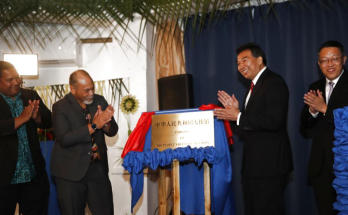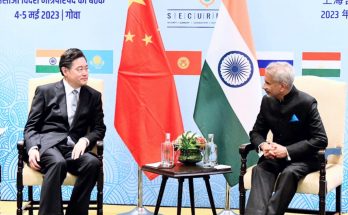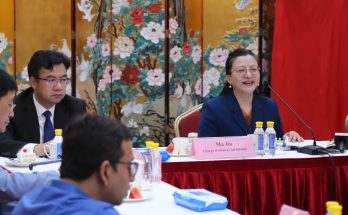Myanmar’s political transition to functional democracy and its emergence as an arena for an unfolding Great Game in the region has sparked a spate of commentaries and discourse on the future trajectory of Southeast Asia’s largest nation. Against this backdrop, Mr Rajiv Bhatia’s book “India-Myanmar relations: Changing Contours” comes as a breath of fresh air as it unravels the evolution and complexities of Myanmar’s ties with the world’s largest democracy and one of the fastest growing economies. The book was launched by India’s Vice-President Hamid Ansari at Indian Council of World Affairs (ICWA) in New Delhi on September 22 in the presence of a galaxy of diplomats, scholars and journalists.
Rajiv Bhatia, a former ambassador of India to Myanmar who played a pivotal role in transforming bilateral relations, has first-hand knowledge of the resource-rich Southeast Asian country and has captured multiple strands of India-Myanmar relations with lucidity and insight in his book. In this interview with Manish Chand, Editor-in-Chief, India Writes Network, Mr Bhatia, who also headed India’s premier think tank ICWA, speaks about various facets of the India-Myanmar relations and argues that the reform period created a congenial environment for bolstering G-to-G (Government-to-Government) relations, but it’s time now to reinforce it with stronger B-to-B (Business-to-Business) and P-to-P (People-to-People) ties. Responding to the much-discussed India-China rivalry in Myanmar, the author has a realist take: “Myanmar has no intention to choose India over China or China over India. It wants cooperation with both as well as their generous assistance.”
(Excerpts from the interview)
Q) What is the central thrust or key argument of your new book “India-Myanmar Relations: Changing Contours”?
A: The result of two decades of Myanmar-watching, this book offers a comprehensive analysis of India’s multi-dimensional relations with its eastern neighbour – Myanmar. It views them in the historical backdrop and the larger regional context. I have also attempted a critical examination of what drives the Myanmar society and polity. A dispassionate look at the India-Myanmar-China angle may be of interest to many.
On the India-Myanmar relationship, one of my arguments is that the reform period created a congenial environment in which G-to-G (Government-to-Government) relations flourished well. But B-to-B and P-to-P (People-to-People) ties need a special push if we wish to safeguard and promote our crucial interests in Myanmar.
Q) The November elections are set to be a landmark in the political evolution of Myanmar. How do you look at the prospects of Suu Kyi’s party emerging as the winner? What kind of post-poll permutations and combinations you visualise?
A: I am not in the business of making predictions; I have to go where my research takes me. After parliamentary elections, one of the two scenarios is likely: NLD does well, but the country gets a hung parliament. Then, negotiations will follow and a president will emerge who is acceptable to all, especially the military. In the second scenario, NLD does incredibly well and wins an absolute majority of the seats in contention. Aung San Suu Kyi could then be close to the point of securing a president of her choice. But this will put her at the cross-roads again: cooperate with the generals or ignore their needs and vision. In the latter situation, trouble could follow quickly.
Q) Ms Suu Kyi has said: “The coming election is our chance to change the system and go for democracy.” Do you see the November elections ushering in real democracy in Myanmar? Will that entail a diminution in the powers of the military establishment?
A: ‘Real democracy’, I presume, means a government of the people, by the people, and for the people. This entails no political role for the military, but the present constitution gives that role to it. Reaching the stage of full democracy in Myanmar appears unlikely within a few months. The country may still need a much longer period of transition because those who wield real power wish to move forward gradually and cautiously. The political elite has a responsibility to fulfil, which is to develop a national consensus on basic questions facing the nation.
Q) What are possible ramifications of the results of the November elections for India? What are 3-4 key areas where you see a major upswing in India-Myanmar relations?
A: If the elections in November, followed by the presidential elections in early 2016, throw up a strong and inclusive leadership, Myanmar will head towards progress. In those circumstances, India-Myanmar relations too will be strengthened further in all relevant areas.
Q) All eyes are on the course of economic reforms in Myanmar. What do the success of these reforms mean for India and Myanmar’s integration into the global mainstream?
A: Economic reforms began well, but the process got stalled sometime back. If the next government is dynamic in character and if it sets its sights on accelerating economic growth, it will certainly attract greater business cooperation and direct foreign investment from many partners and neighbours, including India. Myanmar can do with a sustained dose of policy changes that reform its agriculture, rejuvenate its industry, expand the services sector, and create enormous employment opportunities. It is a resource-rich country. It has to lift its people from poverty and deprivation to an all-round and speedy economic development.
Q) Myanmar is often projected in strategic circles as an arena for competition and rivalry between India and China. Do you see India gaining more influence and economic muscle in Myanmar in days to come at the expense of China? 
A: China’s substantial footprint in Myanmar is a reality. Since March 2011, President Thein Sein has crafted and followed a more balanced foreign policy, shifting away from the excessive dependence on China during the military rule. It suits India if this balanced and pragmatic approach continues.
China has infinitely far more resources than us. We in India need to grasp one basic fact: Myanmar has no intention to choose India over China or China over India. It wants cooperation with both as well as their generous assistance. We need to cultivate cooperative relations with Myanmar because this is in our interest and also in the region’s interest.
Author Profile
- India Writes Network (www.indiawrites.org) is an emerging think tank and a media-publishing company focused on international affairs & the India Story. Centre for Global India Insights is the research arm of India Writes Network. To subscribe to India and the World, write to editor@indiawrites.org. A venture of TGII Media Private Limited, a leading media, publishing and consultancy company, IWN has carved a niche for balanced and exhaustive reporting and analysis of international affairs. Eminent personalities, politicians, diplomats, authors, strategy gurus and news-makers have contributed to India Writes Network, as also “India and the World,” a magazine focused on global affairs.
Latest entries
 India and the WorldMay 3, 2024Trump 2.0 or Biden 2.0, India-US ties will get better & stronger: Aparna Pande
India and the WorldMay 3, 2024Trump 2.0 or Biden 2.0, India-US ties will get better & stronger: Aparna Pande DiplomacyApril 23, 2024Resetting West Asia, re-booting the world, but not fast enough: T.S. Tirumurti
DiplomacyApril 23, 2024Resetting West Asia, re-booting the world, but not fast enough: T.S. Tirumurti India and the WorldApril 22, 2024India’s G20 Legacy: Mainstreaming Africa, Global South in global agenda
India and the WorldApril 22, 2024India’s G20 Legacy: Mainstreaming Africa, Global South in global agenda DiplomacyApril 10, 2024Diplomat-author Lakshmi Puri pitches for women power at LSR
DiplomacyApril 10, 2024Diplomat-author Lakshmi Puri pitches for women power at LSR










